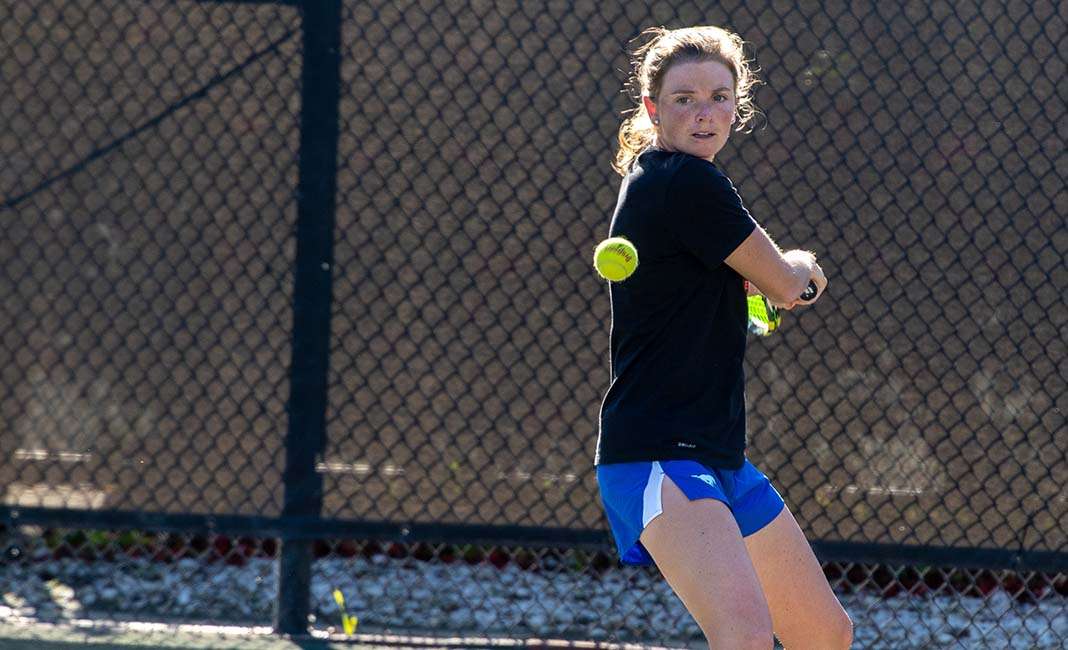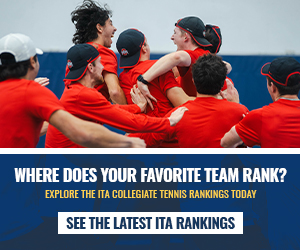By Alexis Casati, SMU Women’s Volunteer Assistant
The first time I met Jeff Nevolo he shuffle-step danced into our office at SMU and said “I’m back baby!” I didn’t know what he was about to do next, but I knew that I needed to be there for it.
A month prior to this encounter, I had called Jeff to discuss his new position as a head coach, and wanted to see if he was looking for a volunteer assistant. Although I was already a full-time assistant, I wanted to continue developing my personal philosophies as a coach — just as many other volunteers do. However, this was before a global pandemic and an economic decline.
According to 2019-2020 team rosters, 33% of all Division I women’s tennis programs and 36% of all Division I men’s tennis programs had volunteer assistant coaches. This number totals out to be 198 volunteer coaches in all of Division I tennis, not including student-assistants or those who weren’t listed on rosters. Even so, that’s kind of a lot of people working for free despite the current state of the economy.
So, what now?
Here’s why you should still volunteer and how you should go about it if you can.
The Rise of Volunteering: Why It’s Becoming a More Prevalent Route
In 1992, the NCAA allowed for a volunteer coach in sports other than basketball and football. According to 2019-2020 rosters, four volunteers from the ‘90s are still in college tennis as head or associate head coaches at Western Michigan, Cincinnati, Seattle and Navy.
According to these coaches, volunteering then was a different experience than it is today. There were many programs that didn’t have two full-time coaches like they do now, so most times the volunteer was around to help out in any capacity they chose. Even a lot of full-time college coaches were also club coaches to help pay the bills.
These coaches touched on the fact that volunteering now 25 years later is more similar to being in a full-time role; getting to travel with the team and meet other coaches in your conference have been some of the more recently added perks. Dave Morin, head coach at Western Michigan and former volunteer at Minnesota said it best: “It’s (now) like getting a masters in your career path, which can be invaluable.”
Coach Morin made another great point: Nowadays volunteers travel with top players to Oracle Masters or futures events, while full-time staff stays with the rest of the team. As this connection between college and pro tennis grows, not only do programs now need three coaches in some cases, but being able to go to these kinds of events as a coach is great experience.
Do Your Research: Where Should You Volunteer and Why?
People volunteer for different reasons. For some, they love college tennis and want to stay involved aside from their other full-time job. If you’re looking to get involved in this way, reaching out to schools close to home might be the best move. Whether it’s hitting partners, help with administrative work, or having another on-court coach on match days, you never know what a local program might need.
For others, volunteering has become an intentional career move; people who know they want to get into coaching—or at least are interested in trying—will go down this path to learn and become more connected before they enter a full-time gig. With recent job cuts and less movement in the full-time job market, one head coach also pointed out that volunteering might be the best option to get into college tennis right now.
On the women’s side, the Big 12 conference is ahead of the game. Whether it was having a current volunteer coach or having a head or assistant with previous volunteer experience, all of these programs were connected to volunteering. On top of that, Kansas, Oklahoma State, Oklahoma and Baylor alone have placed 10 former volunteers into current full-time head or assistant coaching roles. Outside of the Big 12, Georgia Tech has placed three former volunteers in full-time Power 5 roles, and UNC has led three former volunteers to current Division I head coach positions.
On the men’s side, the ACC conference led all 2019-2020 men’s teams in current volunteers with 10 out of 13 schools filling the position. UVA, Wake Forest, and Florida State have placed a total of seven head or assistant coaches. Outside of the ACC, Ball State and Alabama have both had three former volunteers become full-time head and assistant coaches, and Georgia, SMU, Northwestern, Texas A&M, Oklahoma State and Oklahoma have all had two former volunteers join full-time roles as well.
While most of the programs listed above are Power 5 schools, it is important to do your research regarding who is connected and whom you’d be learning from. Amazing coaches who love to mentor and teach are at all types of programs. There are currently 96 Division I women’s and 76 Division I men’s full-time coaches who have had volunteer experience in some capacity. Find them and reach out! They might have some insight on how their experience helped them, or which volunteer jobs are the best for what you are looking to learn.
Advice From Volunteers Turned Head Coaches
After speaking to several current head coaches about their volunteer experiences, it was clear that a lot of them had learned similar lessons: Throw yourself into as many aspects of the program as possible, build relationships off-court with your mentors, take notes. Many of them also viewed their time as an amazing opportunity and expressed extreme gratitude about their experiences. Here are the more unique pieces of advice that I received:
“If you’re good to college tennis, it will be very good to you—but have to nurture that relationship.” Jeff Nevolo, Head Coach at SMU (Volunteer at Alabama and Ball State).
“Just love it. Love the fact that you’re at a bigger program than you’re qualified enough to be paid for. Love the fact that you don’t have the stress of recruiting or the lineup. Embrace that your role is the purest part of the job,” Max Norris, Head coach at Ball State (Volunteer at Ball State and UNC).
“I wasn’t afraid to voice my opinion. Whether something wasn’t right, I saw a moment to speak up about players, lineup, whatever it was, I always said it,” Boomer Saia, Head coach at Iowa State (Volunteer at Kansas and Vanderbilt).
“If you can attach yourself to a program that’s on the rise that can be pretty important—there’s no way to hide success. If you’re at a smaller program there’s only a couple people and some great players making it happen. As a volunteer you would get to be directly a part of that,” Dave Morin, Head Coach at Western Michigan (Volunteer at Minnesota).
“Always try to look at the bigger picture and write things down. You think you’ll remember (drills, etc.) but you won’t. Get out of your comfort zone with the other (men’s or women’s) side, and people in the department; meet as many people as you can,” Marisa Arce, Head Coach at DePaul (Volunteer at Oklahoma).
My Advice As a Current Volunteer
What About Money?
While money is usually the first concern for a young volunteer, it shouldn’t be the main one. Think long-term: goals regarding money should succeed the primary goal of learning and growing as a coach. Don’t let extra monetary goals hinder your best on-court work with the team or being able to contribute new ideas for the program.
With that being said, a piece of advice I received was that your research on where to volunteer should include asking if the school owns their own courts and if they’ll take a part of your earnings in lessons/clinics. Similarly, are you able to work camps at that school? If you find the right place, you can still make a decent living.
Have a Student Mentality
In many ways, volunteering is similar to continuing your education. Try to be in the office as much as possible. If you were in school and missed a class, you’d miss a lesson. Similarly, if you stepped out of the office or missed a practice, you’d miss a learning opportunity.
Before I started at SMU, one of my former college coaches told me to keep a journal for drills, fitness, and practice plans. This has been a great help, however, I have found that taking notes during meetings or team talks can be even more beneficial. This specifically can help with developing your own coaching personality.
Be Authentic And Be Assertive
Volunteers have a unique role in that we’re not the main authoritative figure. We can be authoritative, but we can also be role models, mentors, and friends. There is a special opportunity to build a specific type of relationship and connect with our players in a different way than a head or even full-time assistant coach can. Take advantage of this opportunity to develop your own voice and become an asset to the staff by contributing something that other staff members can’t. Speak up and trust yourself. It doesn’t hurt to be wrong.
Be The Team’s Best Walk-on
Volunteers are similar to walk-ons in a financial sense. Although you’re not getting paid, you still have a position that many others wish they had, and an opportunity to make an extremely positive impact on a young group of people.
Three things you might hear if you walked into our office or locker room at SMU are:
1. Whenever you think you’ve given it all, give more
2. Who’s got it better than us?
3. It takes what it takes
While these phrases are said to our whole team, they can be even more beneficial for someone with no financial tie. There is a very specific role that a volunteer has with the team. Being a team player and doing whatever it takes to be good—even if it isn’t always glamorous—are just the start to fulfilling your role.
Check out our Classifieds page for open positions!




![Succession Success: Nadia Abdala, Head Women’s Tennis Coach, University of San Diego [Coaches Podcast]](https://wearecollegetennis.com/wp-content/uploads/2024/02/Coaches-podcast-Graphic-Nadia-Abdala-218x150.jpg)
![Special Episode: Ask Me Anything with ITA COO Dave Mullins [Coaches Podcast]](https://wearecollegetennis.com/wp-content/uploads/2024/01/Coaches-podcast-Graphic-Ask-Dave-Anything-218x150.jpg)






